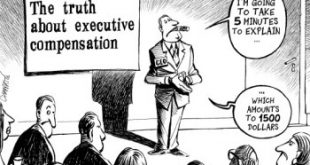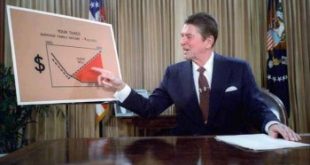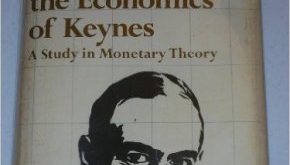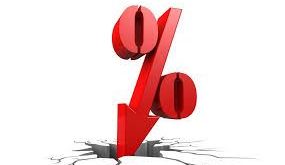Marginal productivity theory — a dangerous thought virus The marginal productivity theory of income distribution was born a little over a century ago. Its principle creator, John Bates Clark, was explicit that his theory was about ideology and not science. Clark wanted show that in capitalist societies, everyone got what they produced, and hence all was fair: “It is the purpose of this work to show that the distribution of the income of society is...
Read More »The ‘practical’ theory of the future
The ‘practical’ theory of the future Now a practical theory of the future … has certain marked characteristics. In particular, being based on so flimsy a foundation, it is subject to sudden and violent changes. The practice of calmness and immobility, of certainty and security, suddenly breaks down. New fears and hopes will, without warning, take charge of human conduct. The forces of disillusion may suddenly impose a new conventional basis of valuation....
Read More »Wren-Lewis trying to cope with ideology
Wren-Lewis trying to cope with ideology Simon Wren-Lewis has also commented on the study by Mohsen Javdani and Ha-Joon Chang — on economics and ideology — that I wrote about earlier today. Says Wren-Lewis: I also, from my own experience, want to suggest that in their formal discourse (seminars, refereeing etc) academic economists normally pretend that this ideological bias does not exist. I cannot recall anyone in any seminar saying something like ‘you only...
Read More »We need more redistribution
We need more redistribution Income inequality as measured by the Gini coefficient rose by about 36% in the 1980s under Thatcher, but the real story is the share of income that goes to people at the very top: According to Greg Mankiw … in the United States the 1%’s share of total income, excluding capital gains, rose from about 8 percent in 1973 to 17 percent in 2010. Between 2010 and 2015 it’s risen from 17% to 22%!! It’s incredibly concentrated even among...
Read More »Economics and ideology
Mainstream (neoclassical) economics has always put a strong emphasis on the positivist conception of the discipline, characterizing economists and their views as objective, unbiased, and non-ideological … Acknowledging that ideology resides quite comfortably in our economics departments would have huge intellectual implications, both theoretical and practical. In spite (or because?) of that, the matter has never been directly subjected to empirical scrutiny. In a recent study,...
Read More »Damon Runyon’s law
To get right down to it, I suspect that the attempt to construct economics as an axiomatically based hard science is doomed to fail. There are many partially overlapping reasons for believing this … A modern economy is a very complicated system. Since we cannot conduct controlled on its smaller parts, or even observe them in isolation, the classical hard- science devices for discriminating between competing hypotheses are closed to us. The main alternative device is the...
Read More »Axel Leijonhufvud
[embedded content]Trying to delineate the difference between ‘New Keynesianism’ and ‘Post Keynesianism’ — during an interview a couple of years ago — yours truly was confronted by the odd and confused view that Axel Leijonhufvud was a ‘New Keynesian.’ I wasn’t totally surprised — I had run into that misapprehension before — but still, it’s strange how wrong people sometimes get things. The last time I met Axel, we were both invited keynote speakers at the conference “Keynes...
Read More »Statistics and mathematics — not very helpful for understanding economies
Statistics and mathematics — not very helpful for understanding economies Statistical science is not really very helpful for understanding or forecasting complex evolving self-healing organic ambiguous social systems – economies, in other words. A statistician may have done the programming, but when you press a button on a computer keyboard and ask the computer to find some good patterns, better get clear a sad fact: computers do not think. They do exactly...
Read More »Low interest rates and leveraged loans — a dangerous combination
Low interest rates and leveraged loans — a dangerous combination A la longue, l’environnement de taux d’intérêt très bas a fini par désorienter les investisseurs et les professionnels des marchés financiers. Puisque placer de l’argent dans des fonds obligataires ne rapporte quasiment rien et que de nombreux titres s’échangent désormais sur des niveaux de taux de rendement négatifs, les hedge funds, mais aussi de grandes compagnies d’assurances et des fonds...
Read More »No reality, please. We’re economists!
No reality, please. We’re economists! Mathematics, especially through the work of David Hilbert, became increasingly viewed as a discipline properly concerned with providing a pool of frameworks for possible realities. No longer was mathematics seen as the language of (non-social) nature, abstracted from the study of the latter. Rather, it was conceived as a practice concerned with formulating systems comprising sets of axioms and their deductive...
Read More » Heterodox
Heterodox










